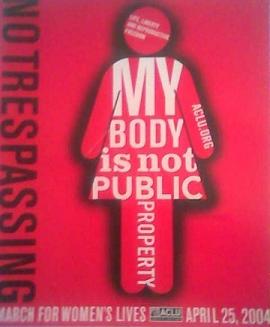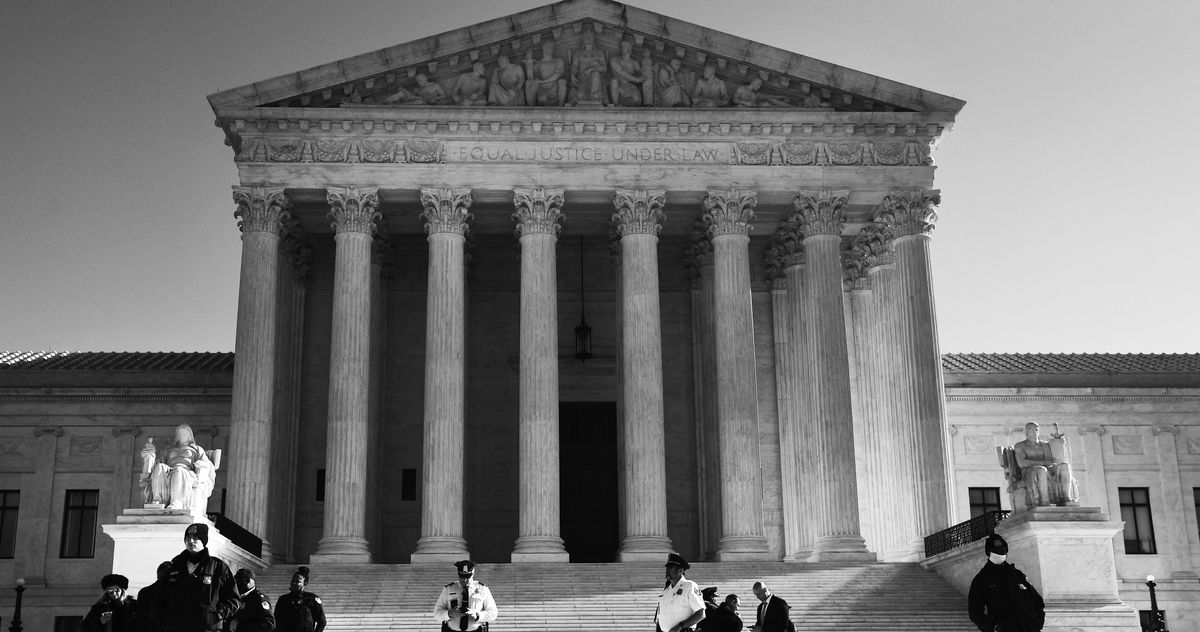Laws Off Bodies
Here's a post from the blog archives of Geekery Today; it was written about 3 years ago, in 2022, on the World Wide Web.

I think that the Supreme Court’s ruling in Dobbs v. Jackson Women’s Health Organization is wrong and deeply alarming. It’s wrong as a matter of principle; its immediate consequences are and will be immensely destructive for women’s individual liberty; and its alarming implications and long-term consequences are likely to be a poison within U.S. American political culture for years to come. Abortion is a woman’s right, an inalienable individual right to bodily autonomy that neither democratic majorities nor state legislatures nor any other government or power on earth has any business infringing, abridging, regulating or overruling. That somewhere around half the states in this country have done so immediately, or will most likely do so within days, is a brutal and heartbreaking display of overweening political power over the most intimate parts of our lives.
I can say more about why if you’re interested — either why I think abortion ought to be recognized as an inalienable individual right, or why I think the Supreme Court ruling is wrong, or why I think it’s awful that state governments may now exercise the power to invasively regulate or prohibit abortion according to democratic rule. For the moment, now that the decision has been handed down, I think it is important to take a careful and realistic look at what the real-world situation is, and to respond accordingly in ways that will seriously address the real-world problem going forward.
State by State
Nothing is over. Abortion is not illegal in the United States. The Dobbs ruling doesn’t claim to make it illegal or hint at any effort to do so. What it does is to put abortion rights into the political process — it removes the Court doctrine that prevented state governments from making it illegal in those states respectively. I think this is an awful decision.[1] But with this decision inflicted, the question is now a question of political organizing and grassroots civil society. The development of safe and effective pills (mifepristone and misoprostol) and telemedicine have dramatically decentralized the technology for safe medical abortions. In about half the states in the country there will almost certainly continue to be pretty vigorously pro-choice abortion laws. (These are a couple of respects, and very important ones, in which the situation now is much better for reproductive liberty than it was in 1973.) Abortion laws, either preexisting ones or new ones passed in a rush, are going to severely curtail or ban abortion in about half the states in the country. Jacob Sullum at Reason has a useful run-down of the effects of the ruling state by state, here: Here Is a State-by-State Rundown of What Will Happen Now That SCOTUS Has Freed Lawmakers To Restrict Abortion
.
Shared Article from Reason.com
Here Is a State-by-State Rundown of What Will Happen Now That SC…
By repudiating Roe v. Wade, the Supreme Court has freed states to set their own abortion policies.
Damon Root @ reason.com
Aid and Abet
Part of what’s going to happen is going to be a matter of political protest, state by state campaigning in state legislatures and all of the mechanisms of political process outside of the courtroom. But it’s also worth remembering the absolutely central importance and power of civil society and grassroots mutual aid to provide direct assistance to people seeking abortion care.
One of the most practically consequential things that you can do right now if you are concerned about access to abortion in the states where it is and will remain broadly legal is to give money to abortion funds, especially abortion funds in states with hostile state governments, and especially in states in the Deep South and the Midwest. Abortion funds are mutual aid networks that provide direct support to people seeking abortions in a particular community or locale. Those that are in areas where abortion access is threatened by hostile state governments have been making plans for months to provide access to travel and abortion care in states where abortion remains legal. This is going to be awful, and it’s going to be expensive, but it is work that they are doing and will continue to do.
I give money to support Yellowhammer Fund, an abortion fund in the state of Alabama: [SEE UPDATE BELOW. -RG, 2022-06-29.]
Shared Article from Yellowhammer Fund
The Yellowhammer Fund envisions a society in which reproductive decisions are made free from coercion, shame, or state interference, a society in whic…
Heidi Miller @ yellowhammerfund.org
Abortion clinics in Alabama shut down immediately when the ruling came out, but Yellowhammer is continuing to operate and actively soliciting support to help cover the costs of funding travel to states where abortion remains legal.
[UPDATE, 29 June 2022. Earlier today, Wednesday 29 June 2022, Yellowhammer Fund sent out an e-mail statement to their supporters stating (emphasis mine): We have made the deeply difficult decision to temporarily pause our services for the safety and security of our clients, our supporters, and our staff. During this time we will consult legal experts to reassess how best to continue doing our work in the immediate future. . . . We assure you that we will always continue to fight for Reproductive Justice in Alabama and the Deep South. We will still serve our communities in the best capacity in our new post-Roe reality. . . . This is an evolution not a defeat.
I do not currently have any further information on when or if they will resume funding or support for women from Alabama seeking abortions. I hope that they will be able to come back soon.]
The West Alabama Women’s Center will continue to provide birth control and other sexual health services, Marty said. Clinic providers hope to provide services to women on Medicaid.
Lauren Frazier, spokesperson for Planned Parenthood Southeast, said the organization’s clinics in Alabama stopped performing abortions before the Dobbs decision came down. They are devoting more resources to patient navigation to help arrange travel for people who need to go out of state.
The Yellowhammer Fund, which provides financial assistance to women who want abortions, said it will have to increase fundraising to cover the high costs of seeking care in other states such as Illinois. The organization also hopes to open a pregnancy and parenting resource center for people who can’t travel out of state and must carry unplanned pregnancies to term, Roberts said.
— Amy Yurkanin, Supreme Court abortion ban: Alabama abortion advocates regroup after Roe v. Wade decision
Al.com, 24 June 2022.
I also support Mississippi Reproductive Freedom Fund, an abortion fund covering the state of Mississippi (which is the state directly and immediately affected by the Dobbs ruling):
Shared Article from abortion
Abortion Funding | Mississippi Reproductive Freedom Fund
Reproductive Care. Abortion Funding. Reproductive Resources. Mississippi Reproductive Freedom Fund.
msreprofreedomfund.org
Texas is the largest state with overtly hostile laws that will most likely make nearly all abortion illegal nearly everywhere in the state. The size of Texas and the very long distances to states with more liberal abortion laws (California, Illinois, or across the border to Mexico) make the question of travel resources especially intense. It’s also a state with a lot of very active abortion funds, most of them based out of the major cities. These are all worth supporting; although you should be aware that Texas’s insidiously, catastrophically, fractally awful SB 8 law includes some provisions targeted at abortion funds. As a result, several of these organizations — especially NNAF-affiliated not-for-profits — are temporarily pausing funding or may be reconsidering what they can do legally going forward:
- Fund Texas Choice (Austin)
- West Fund (El Paso)
- Texas Equal Access (TEA) Fund (Dallas)
- Clinic Access Support Network (Houston)
- Lilith Fund (Austin)
- The Bridge Collective (Austin)
- Frontera Fund (McAllen and the Rio Grande Valley)
- Jane’s Due Process (deals with legal support and 1-on-1 case management for young people dealing with Texas parental consent laws)
- Buckle Bunnies Fund (San Antonio, Corpus Christi, Dallas, Austin and Houston — grassroots network, not an incorporated nonprofit)
Here’s a big list with lots more:
Shared Article from The Cut
Donate to an Abortion Fund Right Now
The Supreme Court has officially struck down Roe v. Wade, ruling that abortion is not a constitutionally protected right. Here’s how to help women a…
Claire Lampen @ thecut.com
- [1]Nobody’s reproductive rights or control over their own bodies should be subjected to political processes or to the control of governments or ruling majorities. Of course they shouldn’t. Jesus. Individual liberty is inalienable.↩




Hello:
Long time since I wrote in your blog. I was wondering…do you think legislators in fascist controlled states will pass bans on women traveling to other states to get an abortion? And if they do, do you think the SC will uphold them? Because for the look of things, in the distance, that seems to be what is going to happen…
Hi Sergio, it’s good to hear from you.
For what it’s worth, I don’t think that states controlled by Republican majorities — even by theatrically belligerent Religious Right majorities, like most of the state governments here in the Deep South — are controlled by fascists in any meaningful or useful sense of that term. Can talk about why I don’t find that way of understanding the political world very useful, even though I despise what the Right is and has been doing in Southern politics and American national politics lo these many years, and I am especially angry and distressed about what they are doing to personal liberties and abortion rights in particular. But let me try to answer your questions directly.
You ask:
The short answer is that I don’t know what they are going to do. I think it’s fairly likely that at least some state legislator(s) in states with deeply anti-abortion majorities and confrontational political cultures — a state like Alabama, Mississippi, or Texas, for example — will try to find a way to float some kind of proposal to this effect. And it’s significantly more likely if states with deeply pro-choice majorities and confrontational political cultures — for example California, to a lesser extent New York or Illinois — continue to make a big political effort to emphasize that they will provide a sanctuary for people from out of state to come and get abortions. (Which they have already been doing somewhat since roughly the time Texas passed SB 8, and especially since the leak of the early draft of Alito’s opinion. To be clear, I think that this is the right thing for them to do and they should keep on doing it, regardless of what kind of reactions it gets from anti-abortion culture warriors. But it is likely to get a reaction from at least some anti-abortion culture warriors.) So I think it’s fairly likely you’ll see some bill making this attempt somewhere, and this will probably get significant news coverage if/when it is introduced.
In fact, depending on how you count things, this may already have happened: back in March of this year, before the leak of the early draft of the Dobbs opinion, during the legal and political strife over Texas’s SB 8 law and a copycat bill in Missouri, Mary Elizabeth Coleman, an anti-abortion representative in the Missouri state legislature, proposed amendments to a pending awful copycat abortion law which would include a provision for allowing lawsuits against abortion providers and against anyone who which she explicitly defended as a means of trying to stop Missourians from crossing state lines (usually to Kansas or Illinois) in order to get an abortion. However, the amendment has so far not been added to the bill, and the bill has not been passed and is not currently scheduled.
In general, I am a lot less confident making any prediction one way or the other about whether any state legislature will have a majority that is willing to pass a travel ban bill. Maybe they will (Alabama and Texas pass really ludicrously bad stunt bills all the time, particularly on abortion rights and anything else of special concern to the Religious Right), but actually passing a bill takes a lot more effort and involves a lot more political risk than simply introducing one. I would be outraged but I would not be shocked if some particularly state legislature around here rushed a bill like that through during a really hepped-up, ban-them-all Special Session, but I really have no very confident belief about whether to rate this as likely, or unlikely, or a toss-up. I really don’t like that I’m uncertain how likely this is or is not.
You also ask:
I think it’s very unlikely that a general travel ban law would make it through the Supreme Court. (The fact that it’s so unlikely to have any chance in court is one reason that I think it’s a bit less likely to make it through a state legislature in the first place — my uncertain guess is that most of the antis in state legislatures right now are probably more likely to want to rack up a bunch of easy political wins for the next couple legislative sessions, rather than to try to push the legal boundaries even further out. But I could be wrong about that.) The reason I think it’s very unlikely is that I don’t see any way they have the votes to sustain it. Kavanaugh’s concurrence explicitly raises the question about travel bans (section III, p. 10; p. 133 of the PDF packet) and he pretty directly states that there’s no chance he’d vote to uphold such a ban:
Of course he could say one thing here and then do another later, but I’d be surprised in this case if this is not a real statement of his views, and there’s just no way to get to a 5 Justice majority on this without Kavanaugh’s vote. (I also think it’s pretty unlikely that all or even any of the other four Justices in the Dobbs majority would be willing to uphold a general travel ban, for precisely the issue that Kavanaugh mentions — it would implicate a basic constitutional principle unrelated to abortion, which basically nobody on the Court would want to implicate, and in ways that would be especially repellant at least to justices like Gorsuch.)
I should say that what I’ve been saying here has been about efforts to inflict a general ban on travel across state lines for abortion, i.e., one that affected anyone who sought an abortion. Back in the 1990s, the standard approach by many anti-abortion politicos was to avoid this by targeting specific classes of women seeking abortions, who could be more easily targeted — in particular, if anti-abortion state governments started trying to pass laws restricting the rights of minors to travel across state lines, I don’t know whether or not those would be upheld, but they’d have a much better chance of succeeding in court than a general travel ban would. (It’s a lot easier constitutionally to get away with all kinds of things if you can tie it to parental control or governmental control over minors.) I hope that nobody attempts this, but I don’t have a good sense of whether or not anyone will.
Mr. Johnson; In the US, our theory of government makes three relevant assumptions. I doubt you’d agree with all of them (I hesitate to embrace them myself), but as citizens, I think we have a responsibility to vote accordingly. 1) Human rights are universal and objective. 2) The rights of all persons are equally valuable (in themselves). 3) The social contract- the government can cause people to sacrifice some rights in order to protect other, greater rights. The first two of these assumptions are stated in the Declaration of Independence and the third is implicit.
If a fetus is a person (by “person” I mean one who possesses inalienable rights), then a fetus has a right to life. The right to life is more important than the right to abortion, based on the premise that the rights of all persons are equal. Therefore, via the social contract, the government should restrict a woman’s right to abortion so the greater right to life of the child is protected. The same logic would be behind laws banning infanticide, just fewer rights of the woman are in play (having an infant is less intrusive than being pregnant).
If a fetus is not a person, then abortion should be mostly unrestricted. The only considerations are a woman’s right to an abortion and her personal safety (though as a libertarian, you might not accept the latter one as a basis for policy).
Obviously, at some point a fetus becomes a person. But that specific point is impossible to determine with certainty, whether conception, heartbeat, viability, or birth. Too many participants in the debate simply pick one of those and hold it on faith (I favor fertilization, for a number of reasons, but I may well be wrong). If abortion is illegal, we risk unnecessarily violating women’s right to have an abortion. But if abortion is legal, we risk killing persons. The former is a safer bet. Yes, it involves infringing on a woman’s rights, but the alternative risk of killing so many is worse.
I won’t delve into the moral or judicial sides of the issue, since the former is too complex, and I’m sure you’re very familiar with the latter.
Hi Kenneth, I noticed that a few copies of your comment got caught in the moderation system; I approved the first one, but all three were slightly different, so I apologize if this version is a bit different from what you wanted to say — just let me know if there’s anything that needs fixing in the version that appears above now.
You are right to suspect that I don’t agree with all three of your stated assumptions. I agree (strongly) with # 1 and # 2, but I flatly reject # 3. (As a consequence, I do, explicitly, reject the United States of America’s theory of government, and indeed deny the legitimacy of all governments and the state as such; I am an individualist anarchist and do not accept as sound any argument premised on the claims of social contract theories of political authority.
That said, I don’t think that your argument depends on a social contract theory of political authority as stated, or at least, it doesn’t need to. I agree with you on the following principle:
(RIGHT) If abortion violates a person’s right to life then abortion may and should be prohibited.
We’ll leave open the question about how; individualist anarchists typically agree that people have rights which they or others are entitled to defend, and acts which infringe or violate those rights should be prohibited and justly may be forcibly prevented or reddressed — although we do not think that governments ought to be the outfits doing either. We can talk about the details of that if you want but I think it’d take us pretty far afield from the issue.
However, I do not agree with the following claim:
(LIFE) If a fetus is a (rights-bearing) person, then aborting a pregnancy violates the fetus’s right to life.
The reason I don’t agree with this conditional is that the as I understand it does not entail or imply an unlimited entitlement to access the means to sustain your life. For a detailed argument why not, in the context of abortion rights, see Judith Jarvis Thomson’s “A Defense of Abortion”, Philosophy & Public Affairs, Vol. 1, no. 1 (Fall 1971), and Roderick T. Long, “Abortion, Abandonment, and Positive Rights: The Limits of Compulsory Altruism”, Social Philosophy & Policy 10, no. 1 (Winter 1993), pp. 166-191. I am a libertarian, and as such think that people have lots of negative rights against coercive interference but few if any positive entitlements to other people’s bodies, labor, persons or property, so I reject LIFE in favor of:
(A NEED IS NOT A CLAIM) It is not the case that: if a person needs the use of another person’s body to live, then they have a right to use it without the ongoing, sustained permission of the other.
(PREGNANCY IS NOT PERMISSION) Permission to access the body of another person, if given, may always be revoked.
For what it’s worth, the overwhelming majority of abortions performed in the United States are performed very early in pregnancy. (Nearly two-thirds before the 8th week of pregnancy, and 88% by the 12th week of pregnancy. Source: Guttmacher Institute, Induced Abortion in the United States). I agree with you that there is some point at which a fetus becomes a person. I don’t agree that the moment of conception is a reasonable candidate for that point, nor is an embryonic heartbeat. (I don’t have a firm account of all the things that make for independent personhood are but I’m pretty sure that they are far more plausibly things that have to do with neurological development and independent activity, not things that have to do with genetics or cardiac regulation.) To be clear, even if I am wrong about that, or if I did grant for the sake of argument that 8-12 month embryos are plausibly considered as likely to be rights-bearing persons, I still would not accept that this implies that their right supersedes a mother’s rights over her body (for the reasons above that I reject LIFE and endorse ANIAC and PINP). So I wouldn’t take that as a feasible case for banning abortion. But I also think even the initial case for regarding them as such is empirically and philosophically pretty weak in the statistically typical cases.